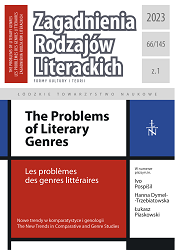Widma Salem. Czarownice z Salem Arthura Millera jako metafora amerykańskiej polityki lat 50. XX wieku
Spectres of Salem. Arthur Miller’s The Crucible as a Metaphor for American Politics in the 1950s.
Author(s): Robert OrłowskiSubject(s): Politics, Post-War period (1950 - 1989), Theory of Literature, American Literature, Sociology of Literature
Published by: Łódzkie Towarzystwo Naukowe
Keywords: witches; Salem; Arthur Miller; play; hauntology; politics; witch-hunts; McCarthyism;
Summary/Abstract: The following article is an analysis of the events in the 1950s that influenced American playwright Arthur Miller to write the play The Crucible. Miller, known for his negative attitude to the activities of Senator Joseph McCarthy and other conservative politicians, decided to metaphorically depict the horror of the second “red scare,” its impact on society and the mechanisms of power behind the hunt, using the witch trials that took place in the town of Salem in 1692. Necessary for understanding Miller’s drama is the essence of the American political scene at the time and the goals that were to be achieved by causing the panic. The article focuses on the similarities between the historical phenomenon that was the witch hunts and the era of McCarthyism. In addition, it addresses the impact of McCarthy’s activities on the issue of women’s rights and the common denominator linking the “red scare” and the hunts themselves — their misogynistic nature. The article also seeks to provide insight into the way in which both Miller’s drama and the events of the 1950s sought to create an enemy that could be helpful in managing society and its fears. Miller’s drama and the post-war history of the US are examined through the lens of Adam Curtis’ documentaries and Mark Fisher’s theory of hauntology
Journal: Zagadnienia Rodzajów Literackich
- Issue Year: 66/2023
- Issue No: 1
- Page Range: 369-378
- Page Count: 10
- Language: Polish

